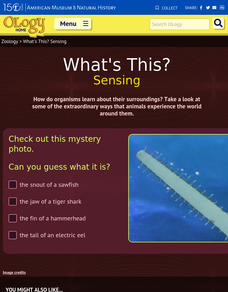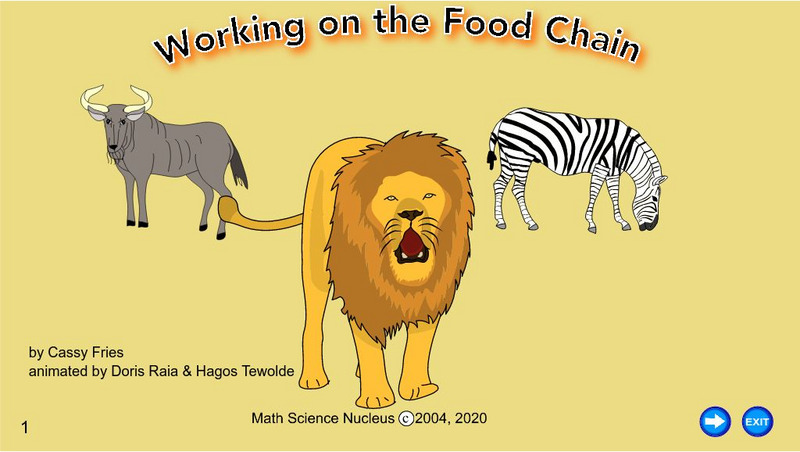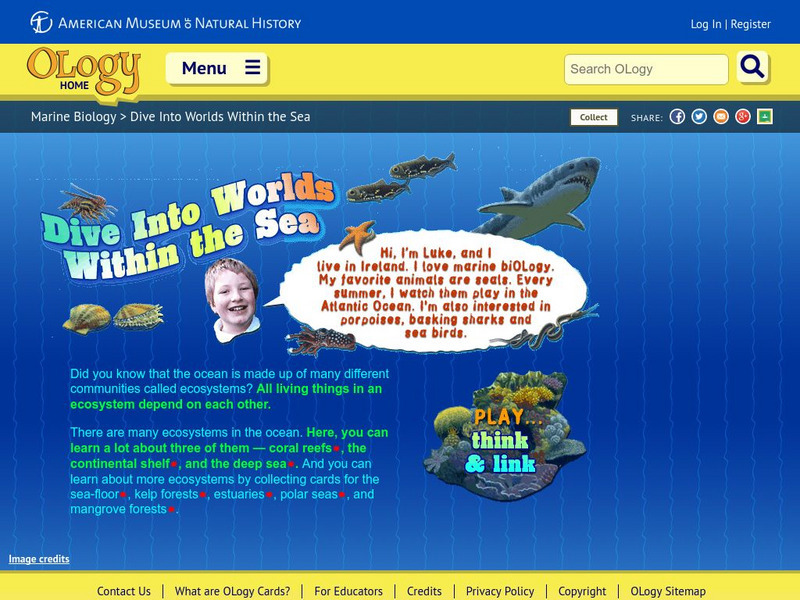Scholastic
Study Jams! Food Chains
Rhinozilla is Mia's bearded dragon and the focus of this lesson on energy flow in an ecosystem. She uses him to explain the energy pyramid, from producers through third level consumers, and she likens the food chain to a video game. Mia...
Scholastic
Study Jams! Food Webs
Rhinozilla is back to take your lesson plan on trophic levels a step higher! After showing the video on food chains (available through the See All Related Jams button), add to it by showing this one. It deals with omnivores and food...
Scholastic
Study Jams! Ecosystems
With the forest as an example, Sam and Zoe talk about the components biotic and abiotic of an ecosystem. They also discuss the role of producers, consumers, and decomposers. This concise clip covers all of the basics. As an introduction...
American Museum of Natural History
Pterosaurs: The Card Game
Piecing together the past is a challenging endeavor. Learners get a taste of that challenge as they play a game that incorporates several components such as trophic levels, geological time periods, and catastrophic events. Pairs work to...
Curated OER
Food Web Relationships
In this food web worksheet, learners create a food web matrix and answer short answer questions about the food chain according to the matrix. Students complete 7 short answer questions.
Curated OER
Wetlands - Food Web Relationships
For this food web relationships worksheet, learners click on the links to learn about the food web relationships in the wetlands and answer short answer questions about it. Students complete 8 questions total.
Scholastic
Study Jams: Symbiosis
Three types of symbiosis are explained: parasitism, commensalism, and mutualism. This is done with colorful animation and lively dialogue in a straightforward and easy-to-follow manner. Have your ecology class watch this at home and then...
Curated OER
English Vocabulary Skills: AWL Sublist 10 - Exercise 3b
In this online interactive English vocabulary skills worksheet, learners answer 10 matching questions which require them to fill in the blanks in 10 sentences. Students may submit their answers to be scored.
Curated OER
Breaking News English: McDonalds
In this McDonalds instructional activity, students read the article, answer true and false questions, complete synonym matching, complete phrase matching, complete a gap fill, answer short answer questions, answer discussion questions,...
American Museum of Natural History
What's This? Sensing
There is a scallop that relies on sight so much that it actually has more than 100 eyes! There are many species that rely heavily on one sense or another. An online interactive resource has youth read about several of these animals. The...
Curated OER
Phytoplankton
In this phytoplankton worksheet, learners read and study online information on plankton blooms to answer 8 short answer questions about the topic.
Curated OER
Breaking News English: Supermarkets
In this supermarkets worksheet, learners read the article, answer true and false questions, complete synonym matching, complete phrase matching, complete a gap fill, answer short answer questions, answer discussion questions, write, and...
Curated OER
Bacteria
In this bacteria worksheet, students fill in the blanks with the correct word. Students then label the structures found on a bacterium.
Math Science Nucleus
Math/science Nucleus: Food Chain Animation
This animation discusses the food chain in a storybook format. The chain is described as a cycle and both herbivores and carnivores are discussed.
Other
Explore Learning: Food Chain Gizmo
In this ecosystem consisting of hawks, snakes, rabbits and grass, the population of each species can be studied as part of a food chain. Disease can be introduced for any species, and the number of animals can be increased or decreased...
Other
Zephyrus: Food Puzzle Chain
Answer these ten interactive questions about ecological feeding relationships by choosing the correct image that completes each food chain.
University of Utah
University of Utah: Learning Center: learn.genetics: Great Salt Lake Food Web
Visualize how energy transfer takes place in two linked food chains, and how it demonstrates the interdependence organisms of the Great Salt Lake.
American Museum of Natural History
American Museum of Natural History: Welcome to Dzanga Sangha
Connect the dots to investigate three different habitats either the forest, bai or river of the rain forest. By connecting the dots students make a food chain to see how organisms in each habitat depend on each other.
American Museum of Natural History
American Museum of Natural History: Dive Into Worlds Within the Sea
Think and Link to investigate three different ecosystem either the deep sea, coral reef or continental shelf. By connecting the dots students make a food chain to see how organisms in each habitat depend on each other.
BBC
Bbc Schools: Ks2 Bitesize: Science: The Living World
This landing page includes learning modules on the following topics of: animals, plants, microorganisms, life cycles and reproductions, food chains, habits, humans and the environment, adaptation, inheritance, and evolution.
BBC
Bbc Schools: Living Things: Food Chains Quiz
How are animals and plants linked? What is the difference between a producer and consumer? How is a predator different from prey? Take this food chain quiz to find out the answers to these questions and more. Links allow you to convert...
American Museum of Natural History
American Museum of Natural History: O Logy: Dive Into Worlds Within the Sea
Learn about three different marine ecosystems: coral reefs, the continental shelf, and the deep sea. Interactive game included, which will help players chart the interrelationships among organisms that live in each ecosystem.
Annenberg Foundation
Annenberg Learner: The Habitable Planet: Ecology Lab
Create the parameters of your own ecosystem by choosing which producers and consumers live there. Visualize how the food web operates and species populations change. This simulator mimics the food web within a typical ecosystem and gives...
Concord Consortium
Concord Consortium: Stem Resources: Predators and Prey
Did you ever want to be a hawk? In this virtual ecosystem, students will take on the role of a hawk and try to catch rabbits on a snowy field. Students will see which rabbits have adaptations that allow them to blend into the environment...
Other popular searches
- Deciduous Forest Food Chains
- Food Chains in Biomes
- Food Chains Food Webs
- Food Chains and Webs
- Food Chains Decomposers
- Food Chains and Food Webs
- Animal Food Chains
- Ocean Food Chains
- Meadow Food Chains
- Food Chains, Food Webs
- Guided Discovery Food Chains
- Food Chains Webs


















